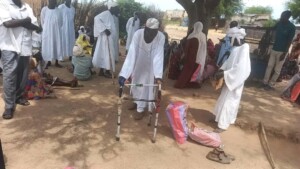Medics raise alarm on medicine shortages in Sudan
According to the Socialist Doctors’ Association, 58 per cent of essential medicines, including life-saving medicines, are not available anymore in Sudan.
The medics say Sudan’s health system has collapsed, and that the very poor medicine supply services “herald a catastrophic situation”.
 A pharmacy in Sudan (File photo)
A pharmacy in Sudan (File photo)
According to the Socialist Doctors' Association, 58 per cent of essential medicines, including life-saving medicines, are not available anymore in Sudan.
In a statement on April 5, addressed to the Sudanese people, the Socialist Doctors Association (SDA) said that the health system in the country has collapsed. The very poor medicine supply services “herald a catastrophic situation”.
The doctors state that the government's reluctance to pay for the provision of medicines to the National Fund for Medical Supplies in the two first months this year is “directly reflected in the lack of dialysis materials, medicines needed for cancer treatments, narcotics, and remedies for mental and neurological disorders”.
They say that the Ministry of Finance did not pay for medical supplies for free treatment for the first two months of this year, hampering the already weak flow of medicines for emergency and life-saving medicines, and for free treatment for children under five.
The SDA called on the Sudanese people “to put pressure on the transitional government to stabilise the health emergency services in the country” by providing work aids, “including paying the debts of medical supplies and providing an amount of $200 million to secure the country's need for emergency medicines”.
The doctors urged the government to spend more on health and exert efforts to rebuild the health system in Sudan, to begin with expanding the pharmaceutical industries in the country, increase the number of medics in health institutions by providing permanent jobs and improving the working conditions.
‘Unprecedented scarcity’
Most of the medicines are imported, and therefore have to be paid with hard currency that still remains scarce. The Professional Pharmacists Association of Sudan said in end March that the soaring prices of essential medicines have created a catastrophic situation where “some remedies now cost more than the minimum wage”.
In July last year, the Pharmaceutical Professionals Alliance painted a bleak picture of the availability of medicines in the country. At a press conference of Pharmaceutical Professionals Alliance in Khartoum on July 2, spokesman Salah Jaafar described the “unprecedented scarcity” as “disastrous, both in the public and private sectors”, as the volume of imported medicines during the past six months fell to nine per cent of the medications required in the country.
In 2016, Radio Dabanga already reported on the worsening “medicine crisis” in the country. Many patients in Khartoum complained about shortages and soaring medicine prices.
A shortage of medicines began to emerge following the fall of the Sudanese Pound that began in early 2012. In September that year, the Central Bank of Sudan reported a growing shortage of hard currencies, and traders began to profit from the difference in forex rates on the parallel market.











 and then
and then